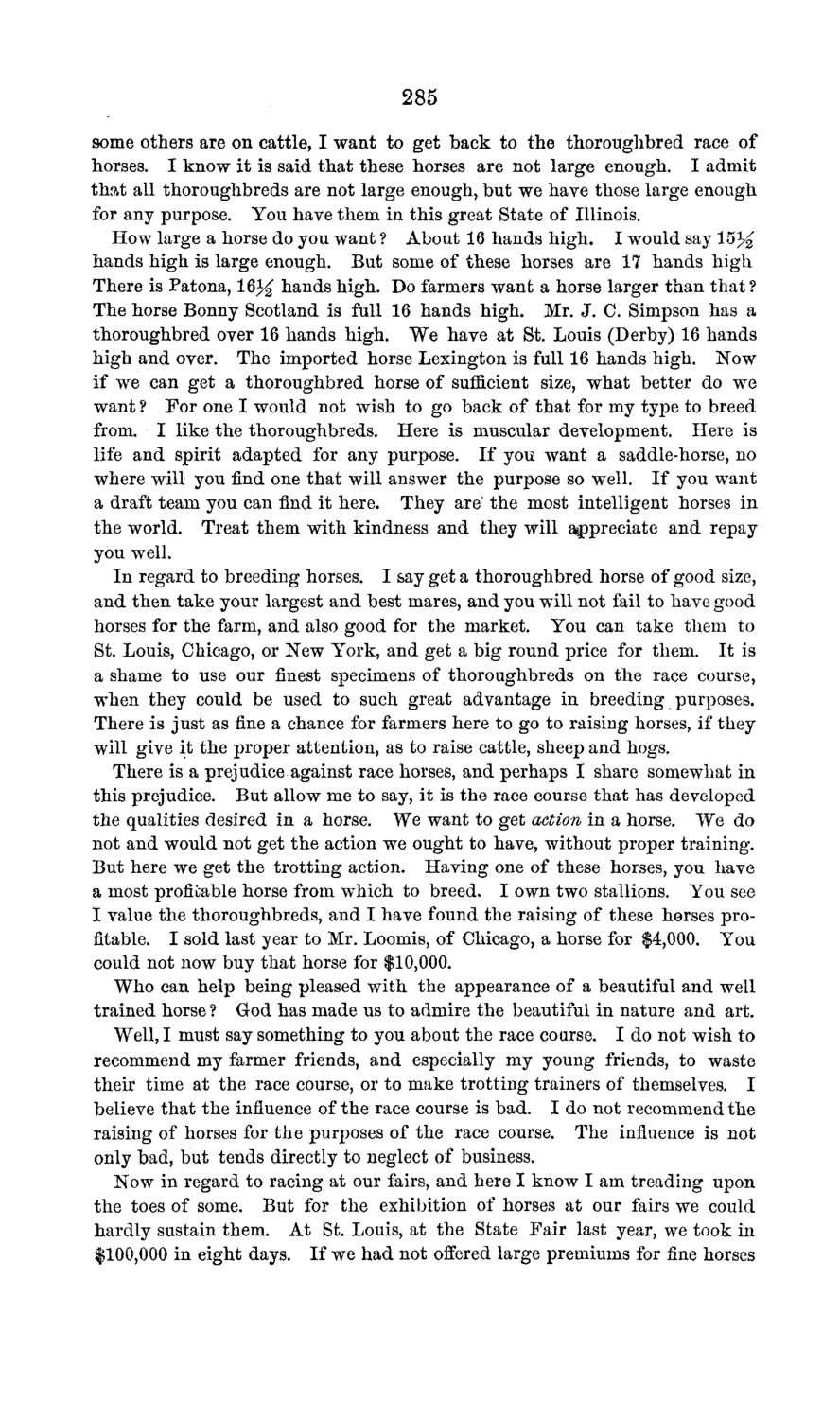| |
| |
Caption: Board of Trustees Minutes - 1869
This is a reduced-resolution page image for fast online browsing.

EXTRACTED TEXT FROM PAGE:
285 some others are on cattle, I want to get back to the thoroughbred race of horses. I know it is said that these horses are not large enough. I admit that all thoroughbreds are not large enough, but we have those large enough for any purpose. You have them in this great State of Illinois. How large a horse do you want ? About 16 hands high. I would say 1 5 ^ hands high is large enough. But some of these horses are 17 hands high There is Patona, 16J^ hands high. Do farmers want a horse larger than that? The horse Bonny Scotland is full 16 hands high. Mr. J. C. Simpson has a thoroughbred over 16 hands high. We have at St. Louis (Derby) 16 hands high and over. The imported horse Lexington is full 16 hands high. Now if we can get a thoroughbred horse of sufficient size, what better do we want ? For one I would not wish to go back of that for my type to breed from. I like the thoroughbreds. Here is muscular development. Here is life and spirit adapted for any purpose. If you want a saddle-horse, no where will you find one that will answer the purpose so well. If you want a draft team you can find it here. They are' the most intelligent horses in the world. Treat them with kindness and they will appreciate and repay you well. In regard to breeding horses. I say get a thoroughbred horse of good size, and then take your largest and best mares, and you will not fail to have good horses for the farm, and also good for the market. You can take them to St. Louis, Chicago, or New York, and get a big round price for them. It is a shame to use our finest specimens of thoroughbreds on the race course, when they could be used to such great advantage in breeding purposes. There is just as fine a chance for farmers here to go to raising horses, if they will give it the proper attention, as to raise cattle, sheep and hogs. There is a prejudice against race horses, and perhaps I share somewhat in this prejudice. But allow me to say, it is the race course that has developed the qualities desired in a horse. We want to get action in a horse. We do not and would not get the action we ought to have, without proper training. But here we get the trotting action. Having one of these horses, you have a most profitable horse from which to breed. I own two stallions. You see I value the thoroughbreds, and I have found the raising of these horses profitable. I sold last year to Mr. Loomis, of Chicago, a horse for $4,000. You could not now buy that horse for $10,000. Who can help being pleased with the appearance of a beautiful and well trained horse ? God has made us to admire the beautiful in nature and art. Well, I must say something to you about the race coarse. I do not wish to recommend my farmer friends, and especially my young friends, to waste their time at the race course, or to make trotting trainers of themselves. I believe that the influence of the race course is bad. I do not recommend the raising of horses for the purposes of the race course. The influence is not only bad, but tends directly to neglect of business. Now in regard to racing at our fairs, and here I know I am treading upon the toes of some. But for the exhibition of horses at our fairs we could hardly sustain them. At St. Louis, at the State Fair last year, we took in $100,000 in eight days. If we had not offered large premiums for fine horses
| |